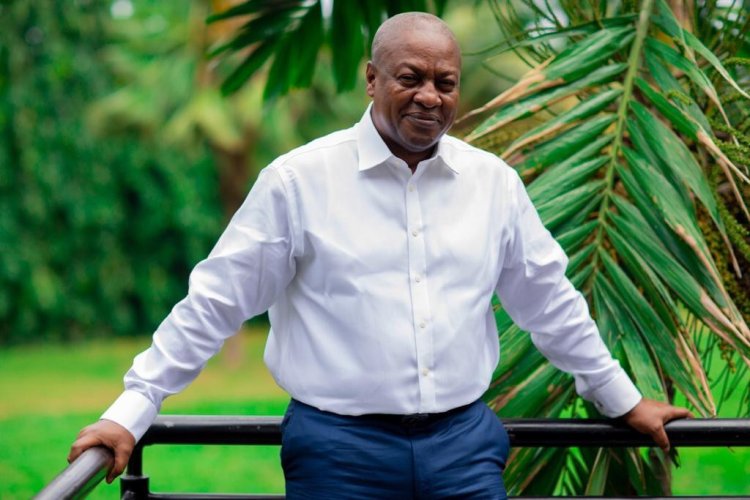Ghana’s President Mahama Demands Reparations at UNGA, Brands the Slave Trade “Greatest Crime Against Humanity”
At the 80th UN General Assembly, President John Dramani Mahama called for reparations for slavery and colonialism, describing the transatlantic slave trade as the “greatest crime against humanity.” He announced Ghana’s plan to introduce a motion demanding compensation, restitution of stolen resources, and the return of looted cultural artifacts. Mahama also pressed for UN reform, including a permanent African seat on the Security Council with veto power, and denounced a global financial system he said is rigged against Africa. His speech was hailed across Africa and the diaspora as a bold step for justice, though it is expected to face resistance from former colonial powers.


New York, 25 September 2025 — In a bold and impassioned address to the 80th United Nations General Assembly, Ghana’s President John Dramani Mahama placed the issue of reparations for slavery and colonialism at the center of his foreign policy agenda, urging a structural “reset” of global institutions to better reflect Africa’s stake in the world order.
Speech Themes: Reparations, UN Reform, African Futures
President Mahama’s remarks were anchored by three interlocking themes:
Reparations and Historical Justice
Mahama asserted that the transatlantic slave trade and colonialism must be formally recognized for the scope of harm they inflicted on African nations. He declared that the slave trade must be recognised as the greatest crime against humanity.
He announced Ghana’s intention to introduce a motion at the UN General Assembly demanding reparations from Western nations. The motion, he said, would call for compensation for the forced removal of over twelve and a half million Africans, restitution of stolen natural resources, and the return of looted cultural artifacts.
Mahama also drew attention to the historical paradox that former slave-owning nations paid reparations to slave owners (for “loss of property”) while the descendants of the enslaved have not been similarly compensated.
Reforming Global Governance
Mahama strongly criticized the current makeup of the United Nations and the global financial architecture. He called for a permanent African seat on the UN Security Council—with veto power—and a mechanism by which the General Assembly could challenge a veto.
He described the international financial system as “rigged against Africa” and demanded reforms in how global capital, debt, and trade are structured.
In his words:
“We are tired of people extracting the most they can from us and offering the least in return.”
African Demographics, Sovereignty, and Voice
Mahama stressed that Africa is not a passive object of global policy but rather a growing fulcrum of the world’s future. He cited UN projections indicating that, by 2050, over 25% of the world’s population will live in Africa.
He also reaffirmed that African nations should retain sovereignty over their natural resources, rejecting the model of vast foreign-controlled concessions.
Domestically, Mahama tied his international vision to his “Resetting Ghana” agenda, citing dramatic gains in inflation control, currency strength, and fiscal stability as proof of African competence in governance.
Reactions & Implications
Continental Resonance
The speech was hailed by many in Africa and the diaspora as a defining moment in the long struggle for reparative justice. Ghana’s elevation of the reparations question to the UN floor, via a formal motion, gives new diplomatic weight to efforts by the African Union and Caricom — which in 2023 initiated a Global Reparation Fund to seek redress for slavery and colonial injustices.
Diplomatic Risks and Pushback
Mahama’s bold posture is likely to stir resistance from historically reluctant Western nations. Questions will arise: How will former colonial powers respond? Will they engage the motion or attempt to sideline it? The success of Mahama’s campaign will depend on securing broad support among UN member states, not just within Africa.
Shifting Ghana’s Global Role
By making reparations a flagship of Ghana’s foreign policy, Mahama is signaling a more assertive international identity—less as a recipient of aid and more as a convener of justice. His domestic economic performance is intended as a foundation for credibility abroad. If Ghana can maintain fiscal discipline, debt sustainability, and growth, it may serve as a model for turning moral claims into geopolitical leverage.
Outlook
President Mahama’s UN address is likely to provoke extensive debate—from legal scholars, international rights organizations, and diplomatic circles—about reparations, institutional reform, and Africa’s rightful place in the 21st century. Whether his proposed motion gains traction will test the capacity of the global system to confront the legacies of the past.
Sources: myjoyonline, UNGA
What's Your Reaction?




















